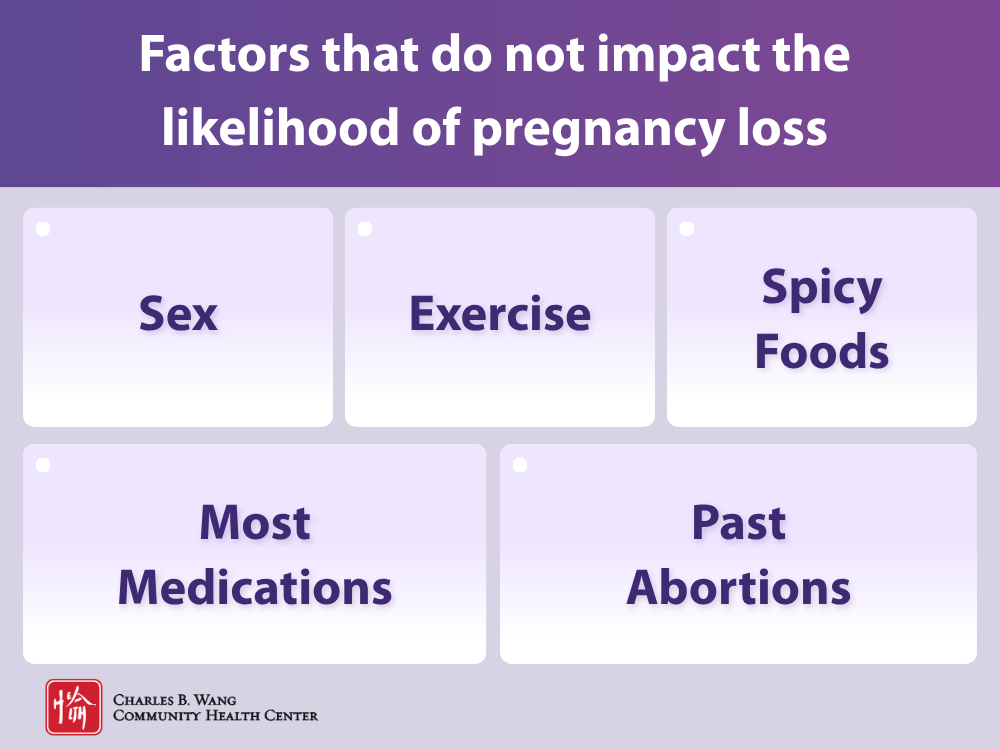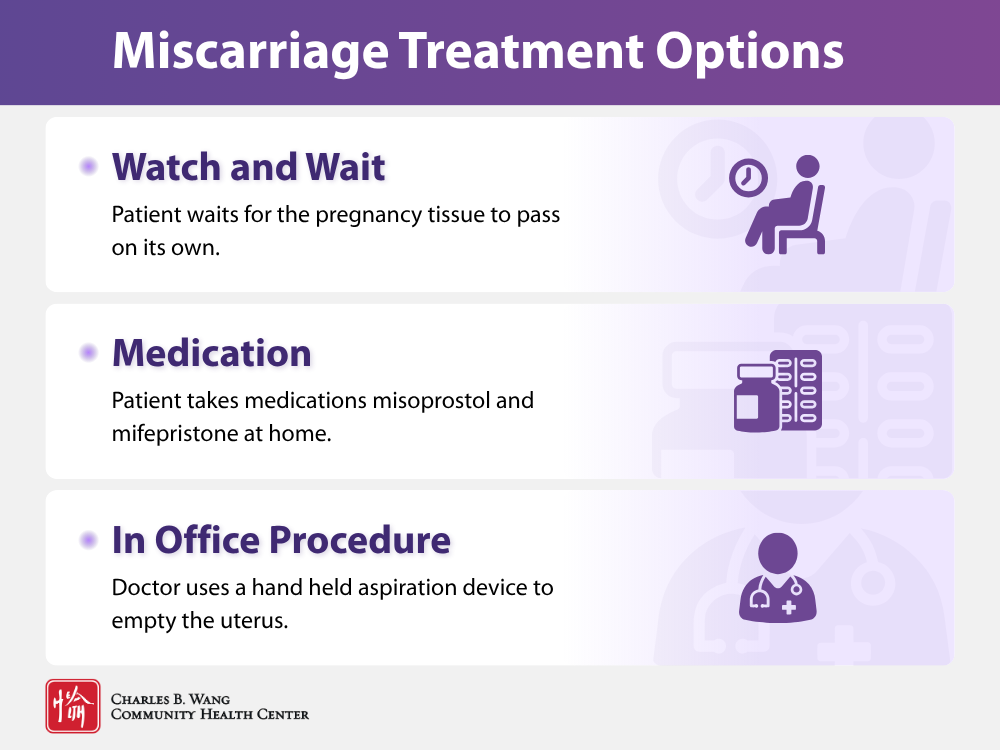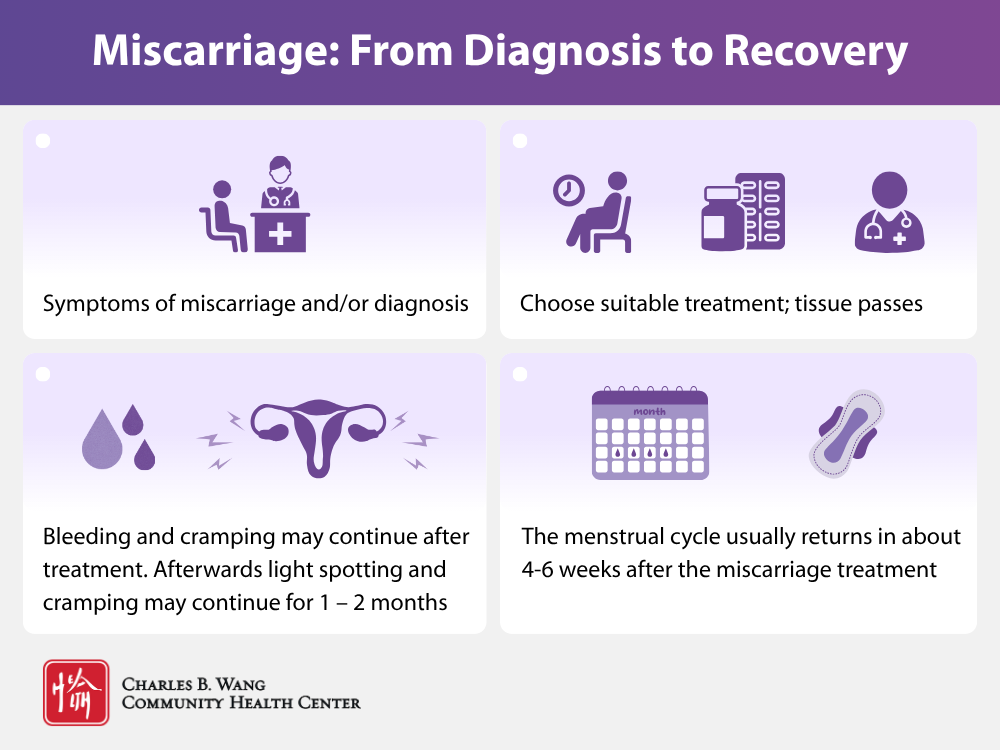Understanding Miscarriage: Navigating the Emotional and Physical Journey of Early Pregnancy Loss
By Joy Nieh, MA
Clinically reviewed by Pearl Tung, DNP

What Is a Miscarriage?
A miscarriage, or early pregnancy loss, is a pregnancy that ends on its own before the 20th week. Early pregnancy loss occurs most often before week 13 of pregnancy; some cases (less than 6% of miscarriages) may occur during weeks thirteen to nineteen.1
If you or someone you care about is concerned about having a miscarriage, please see a provider for the most accurate diagnosis and medical care.
Signs of a Possible Miscarriage
Some people who experience miscarriage will not have any symptoms. For those who do experience symptoms, they may notice:
- Vaginal bleeding
- Discharge of fluid or tissue from the vagina
- Pelvic or lower back pain/cramps
- Abdominal cramps 2,3
Sometimes these symptoms may not be signs of a miscarriage. However, if you do experience any of these symptoms, it is a good idea to check-in with your OB/GYN (Obstetrics & Gynecology) or other healthcare provider to determine if you may need any additional tests. If heavy bleeding or a high fever occur, please seek emergency medical help immediately.3
Why Do Miscarriages Happen?
Miscarriage is common. About 15-20% of pregnancies result in early pregnancy loss.3,4
Most miscarriages are not due to anything within the control of the pregnant person. Random chromosome abnormality is one of the most common causes of miscarriage; about half of all miscarriages are caused by this phenomenon.2
There is a tendency for the pregnant person to blame themselves after a miscarriage. This may be especially pronounced for pregnant people in Asian cultures due to cultural norms and values around family and image.5 However, in most cases, there are no steps a person could have taken to prevent miscarriage.
Some people may be at a higher risk of miscarriage due to certain risk factors including: older age, some chronic illnesses, some infections, severe injury, or abnormal functioning of the uterus, cervix, or hormones.3 If you have any questions about your risks of miscarriage, talk to your OB/GYN or other healthcare provider.

What Will Happen During A Miscarriage?
When a person goes to the doctor’s office for miscarriage concerns, they may already be experiencing symptoms like cramping or bleeding. Some people who are pregnant do not experience symptoms and may learn about a miscarriage during a regular doctor’s visit.4
When miscarriage is a concern, a healthcare provider may complete a physical exam, an ultrasound, or labs to determine if early pregnancy loss has happened.4
During a miscarriage, a person may experience bleeding or the passing of tissue as the pregnancy leaves the body through the cervix and vagina. This process can last from 5 minutes up to a few weeks, depending on the type of treatment.6
For a person who is medically stable and experiencing pregnancy loss, there are three options for treatment to manage a miscarriage. All three methods have been proven to be usually safe and effective, so they can consider their options and choose the treatment that they are most comfortable with. At any point, the person can choose another treatment method if they become uncomfortable with the treatment they initially chose. Certain treatment options may be recommended for someone experiencing complications or safety risks.4,6,7

Watch and Wait
This treatment involves waiting for the pregnancy to pass on its own. With this treatment, it may take 6–8 weeks for the body to begin the process of passing the miscarriage tissue. Once the body begins the miscarriage process, they can expect bleeding and cramps that may last a few hours. This treatment may involve unexpected and intense cramping, so talk to your healthcare provider about options for managing pain during this time.4,6
Medication
This treatment involves taking medicine prescribed by a provider. Medication treatment for miscarriage will always involve the medicine misoprostol, and when it is available, mifepristone may also be prescribed. This treatment can be completed at home, and it does not require waiting for the body to begin processing the miscarriage on its own. During this process, the person taking the medication may experience side effects, including heavy bleeding and intense cramps which may last between 2–6 hours. Talk to your healthcare provider if side effects are serious and for pain management options.4,6
In Office Procedure
This treatment can be completed with local anesthetic in a clinic or the office of your health care provider. Sedation may also be available, but it may require the procedure to occur in a hospital setting so that the sedation can be administered and monitored safely. During this procedure, the healthcare provider will use a hand-held device called an aspiration device to empty the uterus. This treatment may take 5–10 minutes to complete. Cramping may occur during and for 3-7 days after the procedure, so talk to your provider about your pain management preferences.4,6
What to Expect After a Miscarriage
Navigating the Physical Journey
Physical recovery after early pregnancy loss is usually a safe process and does not last very long. The time it will take for tissue to pass, and bleeding and cramping to end will depend on the treatment method. Regardless of the type of treatment a person chooses, they can expect light bleeding and cramping for a few weeks after the miscarriage. The regular menstrual cycle will likely begin about two weeks after this light spotting stops.6,8

During this time, the uterus and hormones begin returning to their pre-pregnancy state. While hormones are readjusting, a person may continue to have pregnancy symptoms like nausea or breast tenderness. For some people, the body may have begun preparing for lactation as early as 12 weeks, so they may experience breast fullness or painful engorgement. At this time, the body is also adjusting to pre-pregnancy hormone levels, which can lead to disruptions to sleep or energy.8,9,10
Generally, physical symptoms are mild and do not last more than a few weeks. If they are severe, ongoing, or interfere with your daily life, reach out to your OB/GYN or other health care provider. You can also talk to your health care provider to discuss your options for reducing pain or suppressing lactation. Heavy bleeding, fever, or pelvic pain may be a sign of a medical emergency; please seek emergency medical support if these symptoms occur.6,8
Navigating the Emotional Journey
After a miscarriage occurs, a person may feel a wide range of emotions: guilt, shame, relief, or ambivalence- there is no one “normal" way to feel. Many people who go through this experience may also be feeling grief. Grief will not happen on the same timeline for everyone, and the way each person feels and expresses their grief will be different.11
During this journey through grief and healing, some families may choose to acknowledge and remember their pregnancy loss in a way that feels meaningful. Some may acknowledge their loss and say goodbye through a letter. Others may choose to memorialize their baby through keepsakes, a memorial service, or by planting in a garden in their honor. Some people may also choose not to memorialize the loss in any way. All options are valid.12,13
It can be hard to speak about the experiences of early pregnancy loss; it may be difficult to find people to connect with, and it may be challenging to seek support. These challenges may even feel insurmountable for pregnant people in Asian cultures, navigating strong cultural values around family and image, or who haven’t yet shared their pregnancy with others.5
Finding support is one of the most important ways to care for yourself physically and emotionally. Support can be from a partner, close friends, family, or anyone you feel comfortable and safe sharing with. There are even support groups available for navigating early pregnancy loss. Sharing this experience with people who understand and validate can be healing.11,12
Future Pregnancy
A common worry for people who experience a miscarriage is: “Will this happen again?”
For those who are planning for another pregnancy after miscarriage, it is very possible to have a healthy pregnancy in the future. Having one miscarriage is not a risk factor for a future miscarriage, and the rate of repeat miscarriages is very low [14, 15]. If you have any questions or concerns about your risks of miscarriage in the future, talking to your OB/GYN or Internal Medicine provider is a great place to start.
It is possible to get pregnant again as soon as two weeks after the miscarriage. Your provider may recommend delaying for longer to give your body a chance to heal.2,16
There may also be reasons that a person would choose to wait before getting pregnant again. Some people do not feel physically or emotionally ready to begin trying for another baby; they might feel uncomfortable with intimacy, or there may be practical reasons they may choose to delay pregnancy. If you would like to delay pregnancy, you can talk to your or OB/GYN or Internal Medicine provider about birth control options; any birth control option that works for you can be used immediately following a miscarriage or whenever you are ready.16
Ultimately, planning for a future pregnancy is not going to look the same for everyone who experiences a miscarriage. Before planning for a future pregnancy, you might consider your reasons for trying or waiting, assessing your physical and emotional comfort, and talking with your partner.12,17
Experiencing a miscarriage affects many aspects of your health, including physical, emotional, and sexual. It is important to remember that these aspects of health are not separate but interrelated; caring for all aspects of your health can help facilitate a healthy healing process.
Support Is Available at the Charles B. Wang Community Health Center
At the Charles B. Wang Community Health Center, our experienced and compassionate OB/GYN providers will make sure to be with you every step of the way during and after your miscarriage. We have multilingual, culturally responsive OB/GYN professional care across Lower Manhattan and Flushing, Queens. We speak 12+ languages including Mandarin, Cantonese, Korean, and Spanish. We also offer audio/video interpretation when needed. Please reach out to our offices if you’d like to learn more or schedule an appointment with us:
- OB/GYN Manhattan: (212) 966-0228
- OB/GYN Queens: (718) 886-1287
You don’t have to go through this alone. Our doctors, nurses, and counselors are here to guide you through every step—physically and emotionally.
FAQ
1. Is miscarriage common?
It is very common. In fact, about 1 in 5 pregnancies end in miscarriage [18]. Many miscarriages happen before someone even knows they are pregnant. In most cases, it is an early miscarriage and occurs before week 13 of pregnancy.1,15,18
2. Does stress or exercise increase the chances of miscarriage?
Most miscarriages are caused by random chromosomal abnormalities in the embryo. There is no known risk of miscarriage due to excessive exercise. The connections between stress and miscarriage are less well known. Everyday stress from work or personal life is unlikely to cause a miscarriage; however, acute or chronic stress may be connected to miscarriage in other complex ways.3,19,20
3. Will all treatment options have the same out-of-pocket costs?
All treatment options are safe and effective, so when choosing a treatment, your preference is very important. One consideration a person might have when considering their options is cost.
The potential cost of miscarriage management treatment will look different for everyone. Differences in health coverage, where treatment is accessed, and the type of treatment chosen may all play a role in the final cost. Most treatment options can take place with a family medicine provider and are covered by most health insurance plans. For individuals who access services through the emergency department or who do not have health insurance coverage, these costs may be higher. Additionally, there are some regulations that prevent cost-effective access to early pregnancy loss treatment; these regulations vary by state and may change over time.16,21
In general, for those who are paying for treatment entirely out of pocket, the most expensive option will be an in-office surgical procedure that requires sedation and the least expensive options will be the watch and wait or medication management options.16 Talk to your health care provider or contact your health plan provider to learn more about affording your preferred miscarriage treatment option.
4. How can I find a support group?
It is important to remember that one doesn’t need to go through this alone, and there is help and support to help process the experience.
Some support groups include:
- March of Dimes
- Postpartum Support International (hotline and support group)
Sources
- https://www.aafp.org/pubs/afp/issues/2007/1101/p1341.html
- https://www.acog.org/womens-health/faqs/early-pregnancy-loss
- https://static1.squarespace.com/static/5d3a2e1399c0960001b14452/t/5f2305c409c8bd7d09015e8e/1596130757882/Early+Pregnancy+Loss+Patient+Education+Sheet+-+ARHP_2018.pdf
- https://www.innovating-education.org/2021/02/epl-evaluation-and-diagnosis/
- https://iexaminer.org/how-cultural-factors-affect-asian-women-who-experience-pregnancy-loss/
- https://static1.squarespace.com/static/5d3a2e1399c0960001b14452/t/672a61b5ee120d0e235311c1/1730830773718/Shared+Decision-Making+Tool+for+Patient+Treatment+Priorities+in+EPL.pdf
- https://ed.ted.com/lessons/what-happens-in-your-body-during-a-miscarriage-nassim-assefi-and-emily-m-godfrey
- https://www.acog.org/womens-health/experts-and-stories/the-latest/what-happens-after-a-miscarriage-an-ob-gyn-discusses-the-options
- https://www.pinkelephants.org.au/what-happens-to-my-hormones-after-miscarriage
- https://www.aafp.org/pubs/afp/issues/2007/1101/p1341.html
- https://www.marchofdimes.org/find-support/topics/miscarriage-loss-grief/dealing-grief-after-death-your-baby
- https://online.nursing.georgetown.edu/blog/emotional-healing-after-miscarriage-guide-women-partners-family-friends/
- https://www.miscarriageassociation.org.uk/your-feelings/marking-your-loss/
- https://www.reproductiveaccess.org/resource/trying-to-conceive-after-early-pregnancy-loss/
- https://www.nhs.uk/conditions/miscarriage/
- https://www.acog.org/clinical/clinical-guidance/practice-bulletin/articles/2018/11/early-pregnancy-loss
- https://www.miscarriageassociation.org.uk/wp-content/uploads/2016/10/Thinking-about-another-pregnancy.pdf
- https://www.stanfordchildrens.org/en/topic/default?id=miscarriage-90-P02471
- https://www.nature.com/articles/s41598-017-01792-3.pdf
- https://vbn.aau.dk/ws/portalfiles/portal/475168207/QuenbyS2021Miscarriage.pdf
- https://www.reproductiveaccess.org/resource/insights-early-pregnancy-loss-in-federally-qualified-health-centers/
Heading
Lorem ipsum dolor sit amet, consectetur adipiscing elit. Suspendisse varius enim in eros elementum tristique. Duis cursus, mi quis viverra ornare, eros dolor interdum nulla, ut commodo diam libero vitae erat.


Heading
Lorem ipsum dolor sit amet, consectetur adipiscing elit. Suspendisse varius enim in eros elementum tristique. Duis cursus, mi quis viverra ornare, eros dolor interdum nulla, ut commodo diam libero vitae erat.
The Charles B. Wang Community Health Center is a nonprofit and federally qualified health center offering comprehensive primary care services to all in six convenient locations in Manhattan and Queens seven days a week.








